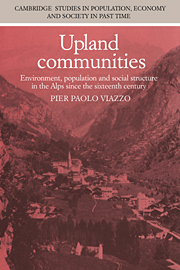 Upland Communities
Upland Communities Book contents
- Frontmatter
- Contents
- List of illustrations
- List of tables
- List of abbreviations
- Acknowledgements
- Introduction: anthropology, historical demography and the study of mountain societies
- 1 Environment, population and social structure: the Alpine village as an ecosystem
- 2 Open systems, open questions
- 3 Anthropologists in the Alps
- 4 The changing demography of Alpine communities
- 5 The traditional economy and its demise
- 6 The causes and consequences of Alpine emigration
- 7 The wealth from the earth: mining and immigration
- 8 Population, resources and homeostatic regulation
- 9 The domestic domain
- 10 Upland communities
- A summary of conclusions
- Bibliography
- Index
10 - Upland communities
Published online by Cambridge University Press: 13 October 2009
- Frontmatter
- Contents
- List of illustrations
- List of tables
- List of abbreviations
- Acknowledgements
- Introduction: anthropology, historical demography and the study of mountain societies
- 1 Environment, population and social structure: the Alpine village as an ecosystem
- 2 Open systems, open questions
- 3 Anthropologists in the Alps
- 4 The changing demography of Alpine communities
- 5 The traditional economy and its demise
- 6 The causes and consequences of Alpine emigration
- 7 The wealth from the earth: mining and immigration
- 8 Population, resources and homeostatic regulation
- 9 The domestic domain
- 10 Upland communities
- A summary of conclusions
- Bibliography
- Index
Summary
Inheritance customs and population growth
Inheritance customs have often been invoked to explain not only the variations in family structure displayed by Furopean peasant societies, but also their demographic evolution. As H. J. Habakkuk recognized in a classic article published over thirty years ago, it is ‘difficult in the extreme to disentangle the effects of the rules of succession from many other circumstances that influence population growth’. But in general he was inclined to believe that the single-heir system tended to retard population growth, and division to promote it. By maintaining a fixed number of openings on the land, he remarked, impartible inheritance curbs nuptiality and encourages the permanent emigration of those children who have no prospect of inheriting land and getting married. Partible inheritance, on the other hand, can be expected to favour local settlement and higher marriage rates, and therefore to result in more rapid population growth.
This argument provides a challenging perspective on the study of the relations between environment, population and social structure in a region like the Alps. Let us consider, in particular, the question of permanent emigration. As we have repeatedly noticed, most students of mountain societies have seen permanent emigration as a way of relieving demographic pressure — a mechanism which either directly (by removing excess population) or indirectly (by reducing nuptiality) prevented population from exceeding the carrying capacity of a given territory.
- Type
- Chapter
- Information
- Upland CommunitiesEnvironment, Population and Social Structure in the Alps since the Sixteenth Century, pp. 258 - 285Publisher: Cambridge University PressPrint publication year: 1989


